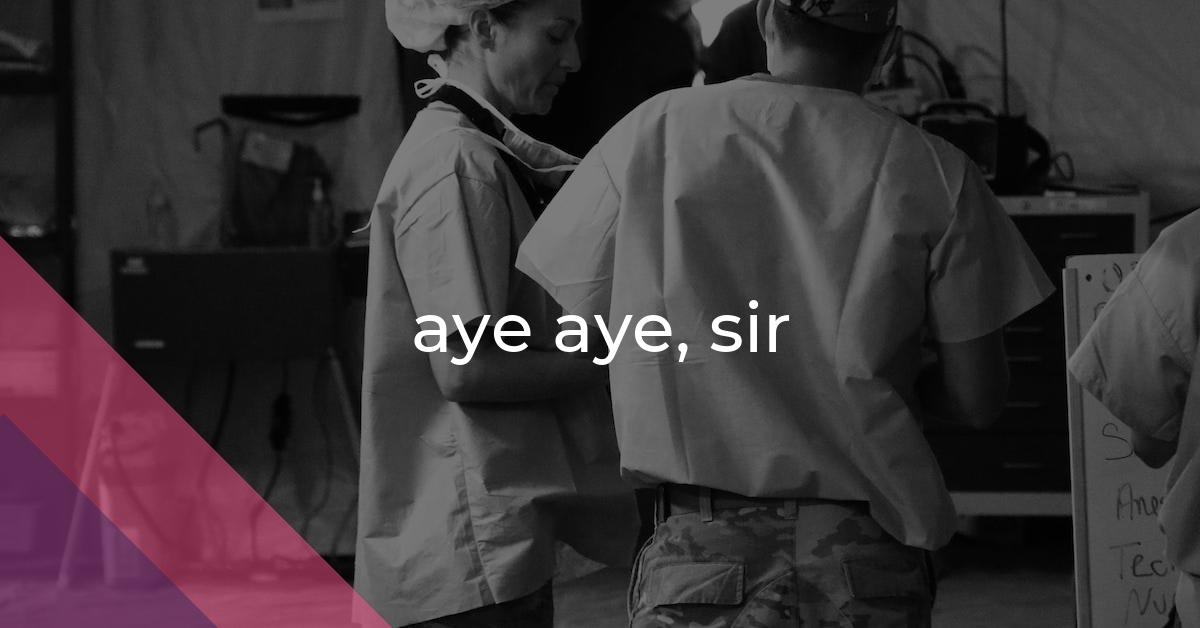aye aye, sir: Idiom Meaning and Origin
What does ‘aye aye, sir’ mean?
The idiom "aye aye, sir" is a nautical expression used to acknowledge an order or command from a superior. It signifies a readiness to comply and is often associated with military or naval contexts.

Idiom Explorer
The idiom "Jack Tar" is used to refer to a sailor or a seaman, often specifically a British sailor.
The idiom "I tell you" is used to emphasize the speaker's earnestness or certainty in what they are saying.
The idiom "here you go" is used when giving something to someone. It implies a gesture of offering or presenting an item or information to another person.
The idiom "here you are" is used to hand something over to someone or to guide someone to a specific location.
"Hands up" is an idiom that is commonly used as an imperative phrase to instruct someone to raise their hands. It may be used in various situations as a gesture of surrender, compliance, or to get someone's attention.
The idiom "go to sea" means to embark on a journey or venture into the unknown. It implies taking risks or engaging in new experiences. This expression is often used metaphorically to describe someone starting a new job or undertaking a challenging task.
The idiom "give someone the old heave-ho" means to dismiss or fire someone, typically from a job or position, often in a sudden or abrupt manner.
The idiom "get the nod" means to receive approval or permission, often in a formal or official context.
The idiom "get one's marching orders" means to be told to leave or to be dismissed from a job or position.
Uncovering Naval Customs
The idiom "aye aye, sir" is commonly used in the maritime context to acknowledge an order or command given by a superior. It is derived from the nautical language of the British Royal Navy and has since spread to wider usage, particularly in the United States. The idiom is often used to convey a sense of respect, compliance, and willingness to carry out the given instruction.
One notable characteristic of the idiom is its repeated use of the word "aye," which serves as a variant of "yes." In maritime jargon, "aye" is a shortening of "aye aye," which is a contraction of the archaic expression "I" for "I understand" or "I hear" and "aye" for "yes." The repetition of "aye" in the idiom adds emphasis to the response, reinforcing the idea of immediate acknowledgment.
The inclusion of "sir" in the idiom is indicative of the military or hierarchical nature of its origin. It signifies the person being addressed as a superior or authority figure. The use of "sir" in this context aligns with naval etiquette and is a way for subordinates to show deference and respect towards their commanding officers.
While the exact origins of the idiom are difficult to trace, it can be inferred that it emerged from the rich naval traditions of the British Royal Navy. The use of similar expressions can be found in various naval documents and accounts dating back to the 18th and 19th centuries.
The idiom's strong association with maritime culture has led to its adoption in civilian contexts as well, particularly within the United States. Due to the historical influence of the British Royal Navy on American naval practices, the idiom has permeated American English and is commonly understood across different regions.
The meaning and usage of the idiom remain fairly consistent throughout different contexts. It is most commonly used as a formal or semi-formal response to a command, indicating the recipient's understanding, compliance, and commitment to fulfill the given order. The idiom's repeated use of "aye" as a shortened form of "yes" adds a distinct flair and is crucial to capturing its intended nuance.
The idiom's longevity and continued usage can be attributed to its concise yet powerful nature. Its simplicity and directness make it an effective way to convey understanding and compliance without the need for elaborate words or explanations. The idiom's historical ties to naval tradition add an air of authority and discipline, lending additional weight to the response.
Related to the idiom "aye aye, sir" are the idioms "attaboy" and "Jack Tar." These idioms, although not as widely known, have origins in maritime culture and have connections to the naval language of the British Royal Navy.
"Attaboy" is an informal expression used to express approval or encouragement. It is often used to praise someone for a job well done, similar to the meaning and spirit of "aye aye, sir." The origins of "attaboy" are unclear, but it is believed to have originated as a contraction of the phrase "that's the boy" and was adopted by sailors to applaud their fellow crew members for their accomplishments.
"Jack Tar" is a slang term that refers to a sailor or seaman. It was commonly used in the British Royal Navy and has since been used more broadly to describe sailors in general. The term "Jack Tar" has parallels to the hierarchical and naval origins of "aye aye, sir," as it represents the common enlisted man, or "tar," who would be addressed with the phrase.
These related idioms, "attaboy" and "Jack Tar," share connections to maritime culture and the naval traditions that gave rise to "aye aye, sir." Like "aye aye, sir," their usage and meaning have expanded beyond their original context, spreading into everyday language and conversations.
As with many idiomatic expressions, "aye aye, sir" holds a depth of meaning and cultural significance that extends beyond its literal interpretation. It embodies a sense of duty, hierarchy, and tradition that has persisted through maritime history. While its usage may have evolved over time, its underlying essence remains unaltered, making it a timeless phrase that continues to be understood and appreciated today.
Example usage
Examples of how the idiom "aye aye, sir" can be used in a sentence:
1. "When the captain gave the order to raise the sails, the crew responded with 'Aye aye, sir' and immediately got to work."
2. "The general commanded the soldiers to move forward, and they all shouted 'Aye aye, sir' in unison before proceeding."
3. "During the naval exercise, the admiral called out the maneuver and the sailors acknowledged with a resounding 'Aye aye, sir'."
More "Nautical" idioms



